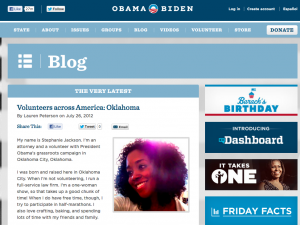Brands
Content Campaign ’12: Battle of the Blogs in the Presidential Race
As part of the Content Campaign ’12 Series, The Content Strategist examines the content published by the presidential campaigns as part of their strategy to win November’s general election.
 Republican challenger Mitt Romney this week leveled accusations that President Barack Obama’s administration has leaked security information.
Republican challenger Mitt Romney this week leveled accusations that President Barack Obama’s administration has leaked security information.
And in response, Obama barely batted an eye.
Both candidates’ actions were indicative of their strategies at large. Being on the offensive is a normal tack for challengers seeking to discredit the current administration.
Romney followed up his charge against the White House with content on his blog.
 Obama, for his part, isn’t paying much mind to Romney’s accusation, at least not in text.
Obama, for his part, isn’t paying much mind to Romney’s accusation, at least not in text.
Instead, Obama seemingly outsourced rolling in the mud to his political adviser David Axelrod, who responded on “Morning Joe” Wednesday.
Axelrod dismissed the charge as “largely a diversion, because what’s he going to talk about—?”
The candidates are sticking to their respective strategy on their blogs.
For Obama that’s “Forward” or “Continuation,” far less punchy than 2008’s “Change.” Romney is going for “Comeback.”

The continuation of Obama’s 2008 momentum is encouraged by his slogan “Forward,” placed front and center on his website and within the content on his blog. These posts focus on the present, with Obama as president, unconcerned with attacks against him.
They include numerous first-person stories of people who are participating in his campaign and have been positively affected by his presidency.
Recent blog headlines for Obama:
- “Faces of the campaign: Ophelia Marcus-Taylor,”
- “Walter: Why I give,”
- “It’s yard sign time,”
- “The First Lady talks White House parenting,”
- “Costs were getting out of hand and President Obama did something about it,”
- “Office opening of the week: East Side, Milwaukee.”
“People want to see themselves in health care, getting healed, getting good care, they want to see themselves saving money,” said Kristina Halvorson, CEO of content strategy consultancy Brain Traffic. “That’s the foundation of advertising: There’s a mom that reminds me of me and she’s pitching something—not a company coming at you with faceless product.”
 Obama’s only recent post to go on offensive against Romney, is a blog post citing an AP article that fact-checked his history at Bain Capital. Even then, Obama only offers up a news story, not necessarily getting his own hands dirty.
Obama’s only recent post to go on offensive against Romney, is a blog post citing an AP article that fact-checked his history at Bain Capital. Even then, Obama only offers up a news story, not necessarily getting his own hands dirty.
Romney’s post are much more concerned with attacking Obama and offering a replacement that will bring things back to the way they used to be. Some recent blog headlines:
- “We Need Mitt Romney,”
- “President Obama Revealed His True Economic Philosophy,”
- “The Buck Stops with President Obama,”
- “We Can’t Afford Four More Years Of Blind Faith To Tyrants,”
- “Florida Small Business Owners To President Obama: We Built Our Businesses,”
- “Obama’s Comments Disappointing To Louisiana Small Businesses.”
Of the four posts on each page of his blog, frequently two or three will have “Obama” in the headline. Obama’s blog is much less likely to mention Romney, especially in the headline.
Additionally, Obama’s posts are more likely to be written by young writers and journalists, whereas much of Romney’s content comes from fellow politicians, like George P. Bush, Bobby Jindal, Jeb Bush Jr., or communally by Romney campaign teams from different states.
 Using attack posts by the Republican old guard—in addition to selling vintage campaign swag—suggests a past era that resonates as better times for his core constituents.
Using attack posts by the Republican old guard—in addition to selling vintage campaign swag—suggests a past era that resonates as better times for his core constituents.
“The comeback team is the team that was winning, was successful, was on top,” said principal consultant of Content Science Colleen Jones of Romney’s approach. “It has encountered some difficulties and now is trying to get back to the success that they had.”
According to Jones, author of Clout: The Art and Science of Influential Web Content, a book featuring case studies of Obama’s 2008 grassroots campaign, “It’s about change, but obviously he can’t use ‘change’ because Obama owned that in 2008.”
Image by FlickrGet better at your job right now.
Read our monthly newsletter to master content marketing. It’s made for marketers, creators, and everyone in between.




